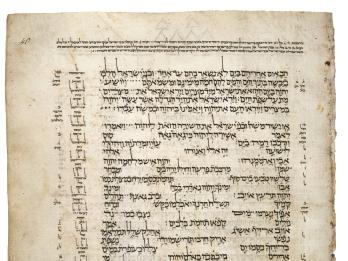Though one God created us: For Lag b’Omer
Joseph Yedidya Carmi
1626
This poem says that wellbeing [shalom] is ours, since we have God as our king, and we have the Torah, whose paths are wellbeing, even though we have acted wrongly and have been trapped by bad hatred, and our holy, glorious Temple has been destroyed. And it says that this all started when David said to Mephibosheth: You and Ziba should divide the field (2 Samuel 19:30), for then a divine voice went forth and said: “Jeroboam and Rehoboam will divide the kingdom” [b. Shabbat 56b]. And it says that due to this sin, 24,000 students of Rabbi Akiva died, as it tells further on. Therefore, it encourages the pursuit of peace. [ . . . ]
Notes
[The Jewish people.—Trans.]
[I.e., the Torah, metaphorically called thus because it is as pleasant as a sweet fragrance.—Trans.]
[I.e., the Tabernacle.—Trans.]
[I.e., the Temple; see 1 Kings 6:6.—Trans.]
[See Deuteronomy 32:42.—Trans.]
[The first kings of the divided monarchies, Judah and Israel.—Trans.]
[Jeroboam set up golden calves as objects of worship, a heinous sin. See 2 Chronicles 13:8.—Trans.]
[See b. Yoma 9b.—Trans.]
[Meaning uncertain. Perhaps: these scholars were valorous for the sake of God (by studying his Torah), who sprinkles down rain from heaven. Or perhaps: they were students of Rabbi Akiva, who “sprinkled”—i.e., spread, his teachings.—Trans.]
[I.e., the day in the messianic future when people’s hard hearts will be replaced with caring hearts; see Ezekiel 11:19.—Trans.]
Credits
Published in: The Posen Library of Jewish Culture and Civilization, vol. 5.



